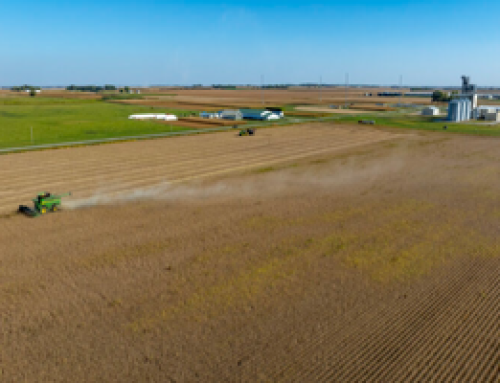By Ryan Hanrahan, University of Illinois’ FarmDoc project
Bloomberg’s Ilena Peng, Dayanne Sousa, and Mariana Durao reported that “President Donald Trump’s unexpected move to threaten a 50% tariff on Brazil risks roiling global commodity markets, disrupting trade on everything from beef to coffee.”
“The US is Brazil’s second-largest trading partner, trailing only China. But while the two nations compete directly in some markets like corn and cotton, Brazil — an agricultural powerhouse — also produces tropical goods like coffee that can’t be grown in the continental US,” Peng, Sousa and Durao reported. “Brazil has been ramping up beef shipments to meet growing US demand, and is a key supplier of wood pulp used in everything from books to toilet paper. That’s spurring hopes that some sectors could be singled out or exempted from tariffs.”
“Still, Brazil’s strength in commodities gives it some flexibility, and the country could ease the impact by finding buyers elsewhere,” Peng, Sousa and Durao reported.
Agri-Pulse’s Oliver Ward reported that “some farm-state lawmakers are eyeing potential opportunities for the U.S. agricultural sector should President Donald Trump follow through on his threat to impose steep new tariffs on Brazil.”
“‘I’m very happy to keep Brazil out of my agriculture market,’ Sen. Roger Marshall, R-Kan., told Agri-Pulse on Thursday,” Ward reported. “‘Brazil manipulates our markets when it comes to sugarcane being used for ethanol.'”
“Sen. Deb Fischer, R-Neb., said she’s ‘not surprised’ that the president opted to hike duties on Brazil. ‘I think the president is trying to level the playing field for agriculture,’ she said,” according to Ward’s reporting. “‘Brazil can import to the United States duty-free,’ Fischer added. But when U.S. ethanol producers, like those in her state, send product to Brazil, they face an 18% tariff, she noted.”
How Beef Trade Could be Impacted
For beef, Peng, Sousa and Durao reported that “American meatpackers, facing the smallest US cattle herd since the 1950s, have been relying more on supplies from countries like Brazil. Demand is also rising as consumers on weight-loss drugs seek out high-protein foods. In 2024, about $1.4 billion of beef was imported into the US from Brazil, according to the US Department of Agriculture.”
“Brazilian producers will likely redirect shipments, with meatpacker Minerva SA saying it can also supply the US market with its operations in Argentina, Paraguay, Uruguay and Australia,” Peng, Sousa and Durao reported. “Still, the Brazilian Association of Meat Exporters pointed to risks for ‘global supply and food security’ while pledging for more dialogue between the two countries.”
Reuters Maytaal Angel and Marcelo Teixeira reported, however, that “the tariff has been welcomed by U.S. cattle producers. ‘We fully support this tariff on Brazil. Brazil’s exports (have) contributed to the shrinking of our U.S. cattle industry. We need to rebuild and reduce our nation’s dependency on imported food. This is a step in the right direction,’ said R-CALF USA.”
How Coffee and Orange Juice Trade Could be Impacted
Peng, Sousa and Durao reported that “the US imported nearly $2 billion worth of coffee from Brazil in 2024, according to the US Department of Agriculture. The shipments are roughly 30% of US coffee consumption, Brazilian coffee exporters group Cecafé said.”
“‘It’s a loss to our companies, and it means more costs and more inflation to American consumers,’ Cecafé Chief Executive Officer Marcos Matos said,” according to Peng, Sousa and Durao’s reporting. “…Tariffs on Brazil could result in coffee prices rising ‘quite a lot,’ Giuseppe Lavazza, chairman of Italian roaster Lavazza, said on Bloomberg Television.”
Angel and Teixeira reported that “more than half of the orange juice sold in the U.S. comes from Brazil, meanwhile, while the South American country also sells sugar, wood products, oil and oil products.”
“U.S. Commerce Secretary Howard Lutnick said last month during a Congress hearing that some natural resources that are not available in the U.S., such as tropical fruits and spices, could be exempt from tariffs, depending on negotiations with the countries producing and exporting them,” Angel and Teixeira reported.
Brazil Says it Will Respond with Reciprocity
CNBC’s Kevin Breuninger reported that “Brazilian President Luiz Inacio Lula da Silva said Wednesday that his country will respond with reciprocity to U.S. President Donald Trump’s newly announced 50% tariff rate on his country’s exports, citing a recently adopted Brazilian law that authorizes the government to take proportional countermeasures.”
“‘Brazil is a sovereign country with independent institutions that will not accept being lectured by anyone,’ wrote da Silva, according to a CNBC translation of his social media post,” Breuninger reported.



